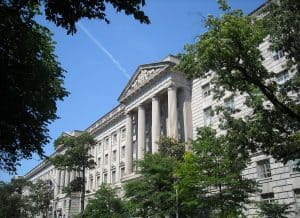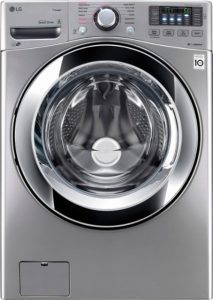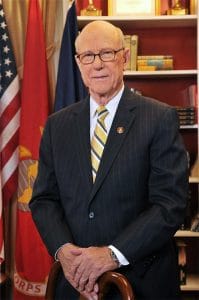The weekly report by our trade correspondent, L.C., follows
Trade decisions loom. What to do?

Herbert Hoover building, headquarters in Washington DC of the Department of Commerce
January is a decision month with respect to China, NAFTA, and the World Trade Organization (WTO). It brings several opportunities for presidential action under US trade law Sections 301, 201, and 232. Many analysts speculate that President Trump will use one or more of these to take the sort of unilateral action he pledged as a candidate. The most benign from the standpoint of the global trading system — and probably most effective course among the opportunities before him — would be to move under Section 301 to take two specific actions targeting China that he could tout as fulfilling his promises.
One would be to take up the offer by Japan and the EU – to which the US agreed in December – to act collectively at the WTO by jointly filing a complaint based on the results of the Section 301 investigation. That investigation will almost surely determine that China’s
- enabling and encouraging of intellectual property infringement,
- its abusive tech transfer practices,
- its unfair subsidies,
- and its state-owned enterprises
amount to illegal discrimination and violation of WTO rules.
In keeping with US law and US promises to the WTO regarding how Section 301 will be used, it should result in WTO complaints on one or more of the identified issues. Since Tokyo and Brussels have already pushed for joint action on these matters, they should join in – making the case more powerful and also removing the perception that it is simply a US-China (or worse, a US-WTO) standoff. This would test the ability of the WTO to deal with crucial 21st century issues targeted by the Section 301 investigation. It would thus likely strengthen the WTO, while crimping Beijing’s ability to push ahead unchecked with plans for technological hegemony based on walling off its economy while expropriating US innovations.
Although the US-Japan-EU December agreement also identified excess capacity as a problem to be addressed, the Trump Administration has not availed itself of opportunities to do so, having declined to send US Trade Representative Robert Lighthizer to the ministerial meeting of the Global Forum on Excess Capacity and declined to even respond to Beijing’s proposal to cut capacity as part of larger US-China talks. Of course, there were few indications that either effort was likely to be successful. But it remains possible that a WTO case against subsidies and state-owned enterprises (SOEs) that spur overcapacity might be effective, so this issue could also be a subject for US-EU-Japan joint action.
Second, the President could also announce in reaction to the Section 301 investigation that his Administration will be working on its own and with Congress to revise the functioning of the Committee on Foreign Investment in the US (CFIUS) so that it is a sharpened tool for restricting Chinese acquisition of US innovative, systemically or militarily important, and high-tech assets. There are indications that CFIUS is already becoming more aggressive, and legislation to toughen it is already moving in Congress, but a presidential statement promising to make life tougher for Chinese companies operating here in response to China’s mistreatment of US companies would be a credible response to the 301 findings.
Safeguard measures against imported solar cells and washing machines

LG washing machine
There are strong arguments against imposing safeguards not just against China but also South Korea. But going after South Korea would undermine Administration priorities
- not to discourage foreign investment in the US, especially investment in new factories;
- not to set a bad precedent for other countries to block US exports;
- not to take protectionist action that could scare investors more broadly (e.g., the stock market);
- and not to unnecessarily anger trading partners.
If the US acts to restrict South Korea’s benefits under the bilateral Korean-US Free Trade Agreement (FTA), it would discourage other trading partners’ interest in entering new FTAs with the US.
Yet in both the solar and washer safeguards situations, the President appears to be backed into a corner. Unless he moves first to impose restrictions on China through Section 301 – perhaps along the lines we suggest above – or the Section 232 steel and aluminum cases, the safeguard cases will be his first opportunity to comply with his campaign vow to take unilateral action on trade. The deadline for his solar decision comes first, on January 26th, four days before his State of the Union address.
Pressure from the agriculture sector

Senate Agriculture Committee Chairman, Pat Roberts (R-KS)
This week, the President met with six Republican senators from the Agriculture Committee, led by Chairman Pat Roberts, on January 4th. Roberts said afterwards that Trump “really listened to our concerns.” He said he stressed that US agriculture needs the country to “maintain our status as a reliable supplier… especially… in NAFTA renegotiations…. I told him we need a good Farm Bill and the best trade agreements possible for all sectors of our economy.” The President’s statement after the meeting had a somewhat different nuance. The President “was glad to speak… about the trade policy priorities both he and the Senate will be focusing on in 2018, including securing more equitable trade deals with our partners, increasing exports, and ensuring American industries are treated fairly around the globe.”
Also on January 4th, the US Chamber of Commerce held a private meeting of its NAFTA Coalition, which brings together various industry associations. Reportedly, Chamber officials pointed to some positive developments, including the senators’ meeting with the President and a similar meeting by several Republican governors with White House officials. The various associations in the coalition will continue to hold meetings with elected officials and release data showing how NAFTA benefits different parts of the country and different commercial sectors. The meeting confirmed that the message business will send is – unsurprisingly – that the benefits of tax reform and deregulation should not be allowed to be undercut by a NAFTA failure, and while business supports modernizing NAFTA, withdrawing from trade agreements would be a blow to the economy. The senators, in their White House meeting, reportedly also stressed to the President that a NAFTA failure would risk the stock market’s gains.
CFIUS blocks another Chinese acquisition
As to the issue of whether the CFIUS has been aggressive enough in blocking Chinese acquisitions of US companies, CFIUS just blocked another transaction. Ant Financial Services Group, affiliated with Alibaba and owned by Jack Ma, had been seeking to merge with Texas-based MoneyGram International, Inc. But security questions had been raised for months, centered about the potential release to a Chinese entity of sensitive personal information on US citizens – many in the military – who use MoneyGram to transfer funds, including internationally. The case highlights the increasing focus on the need to protect individual privacy, especially financial data, in the age of “big data” when such information has strategic commercial uses. In this case, the disclosure of information on members of the armed forces added a national security component. The companies had tried unsuccessfully to accommodate CFIUS concerns by offering, among other things, to keep all information within the US.
The two companies announced the end of their merger effort in a January 2nd statement: “Despite our best efforts to work cooperatively with the US government, it has now become clear that CFIS will not approve this merger.” They said they will continue to work on new initiatives together. MoneyGram pointed out that, “The geopolitical environment has changed considerably since we first announced the proposed transaction… nearly a year ago.” Clearly this refers both to the Trump Administration’s coolness to trade and investment relations with China as well as to the increasing pressure on CFIUS itself to subject transactions to greater scrutiny.
Senator Hatch likely to be replaced by a pro-free-trade senator
Sen. Orrin Hatch (R-UT), Chairman of the Senate Finance Committee, announced on January 2nd that he will not seek reelection this fall. Hatch’s replacement as chairman of the Finance Committee – one of the most powerful positions on Capitol Hill that oversees, among many other areas, trade policy – is expected to be either Sen. Chuck Grassley (R-OH) or Sen. Pat Roberts (R-KS) – if Republicans retain control of the Senate. Grassley and Roberts, like Hatch, are traditional free traders and supporters of trade expansion and trade agreements. Both are particularly focused on agricultural trade and have been actively trying to push the President away from jeopardizing NAFTA. Despite Hatch’s free-trade orientation, he has been especially interested in intellectual property protection and often pushes for the goals of the pharmaceutical industry. His insistence that the Trans-Pacific Partnership (TPP) not be enacted unless changed to raise the biologic drug test data protection period may have prevented a TPP vote in Congress last year.
Trade data and monetary developments
The Commerce Department announced on 1/5 that the November US goods and services trade deficit rose 3.2% – above expectations – to $50.5 billion, up $1.6 billion from October’s upwardly revised $48.9 billion. The fact that GDP and jobs growth are strong while the trade deficit also rises undercuts the White House’s argument that trade deficits hurt the economy and jobs. That US imports have been rising while the dollar has been falling also undercuts the White House argument that weaker currencies unfairly hinder imports. Of course, Democrats and other trade hawks accepted the White House argument that trade deficits are bad for the economy, and so denounced the deficit rise as a failure by the White House to accomplish one of its stated priorities.
Click here to go to the previous Founders Broadsheet post (“Lunacy on the Left over repeated failed attempts to bring down Trump”)

Leave a Reply